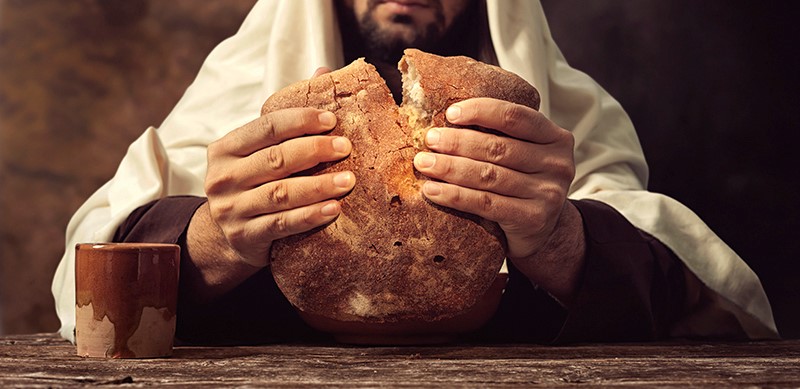Twentieth Sunday of the year August 18, 2024
Proverbs 9:1-6; Ephesians 5:15-20; John 6:51-58
‘Anyone who eats this bread will live forever.’ These words
of Jesus from today’s gospel set the tone of our celebration today. We who
share this meal share in the life of Jesus. And as he says: ‘As I draw life
from the Father, so whoever eats me will draw life from me.’
In today’s gospel passage, Jesus speaks of the food that he
gives for the life of the world in many different terms. Firstly, he speaks of
it in terms of bread and wine, although he uses the word “drink” not “wine.”
But he speaks of it in terms of ordinary and normal food and drink. “Whoever
eats of this bread will live forever,” (v.51b) “for my flesh is true food and
my blood is true drink” (v. 55).
Secondly, he speaks of it as being his flesh and his blood.
“Unless you eat the flesh of the Son of Man and drink his blood, you have no
life in you. Those who eat my flesh and drink my blood have eternal life (vv
53-54). “Flesh and blood” is a phrase that means the whole person. Some
scholars think that by speaking separately of his flesh (“meat”, not “body” as
in the other gospels) and his blood, Jesus is referring to himself as the lamb
of sacrifice with its blood separated from its flesh.
And thirdly, he speaks of the life-giving food as himself.
“I am the living bread that came down from heaven. ... whoever eats me will
live because of me” (vv 51,57). Here he identifies the bread from heaven not
just with his body which is only a part of his total person but with himself in
its totality.
The first reading from the Book of Proverbs portrays Wisdom
as a gracious hostess, preparing a banquet and inviting all to come and partake
of her feast. Wisdom calls out to the simple and those lacking understanding,
urging them to "come, eat of my bread and drink of the wine I have
mixed." This invitation is not just to a physical meal but to a
life-giving relationship with Wisdom, which leads to understanding,
righteousness, and a deeper communion with God.
The imagery of a banquet in this passage foreshadows the
Eucharistic banquet that Jesus will institute, where He offers Himself as the
true Bread of Life. Wisdom’s invitation is universal, extending to all who seek
life and desire to walk in the ways of understanding. The challenge for us
today is to respond to this invitation with openness and humility, recognizing
our need for God’s wisdom in a world often driven by pride and self-reliance.
In the gospel, Jesus makes the astounding claim that He is
the living bread that came down from heaven. "Whoever eats my flesh and
drinks my blood has eternal life," Jesus declares, promising that He will
raise them up on the last day. This teaching is central to the Catholic
understanding of the Eucharist, where we believe that the bread and wine become
the Body and Blood of Christ.
Jesus’ words are challenging, and many of His listeners
struggle to accept them. Yet, He does not soften His message or offer a
metaphorical interpretation. Instead, He insists on the reality of His presence
in the Eucharist, a mystery that calls for faith and trust in His promises.
For us today, the Eucharist is the source and summit of our
Christian life. It is in the Eucharist that we encounter the living Christ, who
nourishes us with His very self and sustains us on our journey of faith. The
challenge is approaching the Eucharist with reverence and deep faith,
recognizing it as the true Bread of Life that gives us eternal life.
The readings for this Sunday invite us to reflect on the
wisdom of God and the gift of the Eucharist. Wisdom calls us to a banquet of
understanding and life, while Jesus, the incarnate Wisdom of God, offers us the
Bread of Life. As we partake in the Eucharist, let us do so with grateful
hearts, seeking to live wisely by aligning our lives with God’s will. May we
always draw our source of life from His Body and Blood just as the little boy
did towards his sister.
Happy Sunday


No comments:
Post a Comment